 Petzlover
Petzlover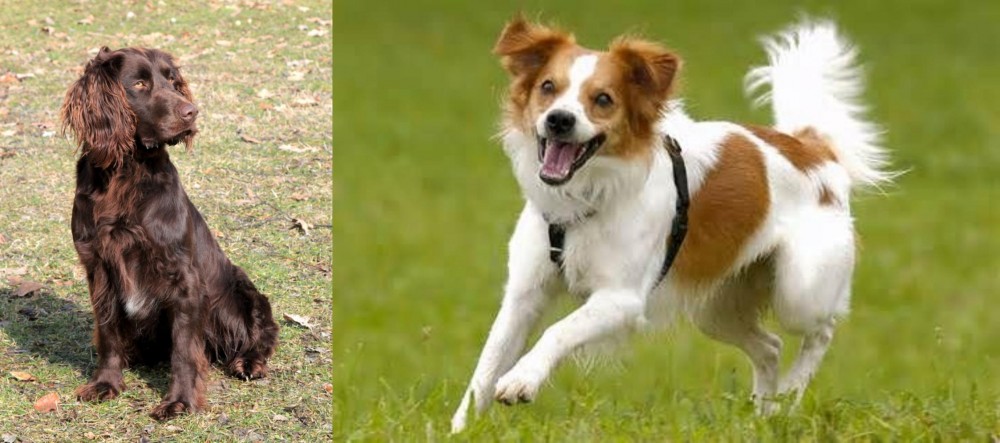 Both German Spaniel and Kromfohrlander are originated from Germany. German Spaniel may grow 8 cm / 4 inches higher than Kromfohrlander. German Spaniel may weigh 9 kg / 20 pounds more than Kromfohrlander. Both German Spaniel and Kromfohrlander has almost same life span. German Spaniel may have less litter size than Kromfohrlander. German Spaniel requires Moderate Maintenance. But Kromfohrlander requires Low Maintenance
Both German Spaniel and Kromfohrlander are originated from Germany. German Spaniel may grow 8 cm / 4 inches higher than Kromfohrlander. German Spaniel may weigh 9 kg / 20 pounds more than Kromfohrlander. Both German Spaniel and Kromfohrlander has almost same life span. German Spaniel may have less litter size than Kromfohrlander. German Spaniel requires Moderate Maintenance. But Kromfohrlander requires Low Maintenance
 Looking like a smaller version of the Red Setter, the German Spaniel, known also as the Deutscher Wachtelhund or German Quail Dog, hails from Germany.
Looking like a smaller version of the Red Setter, the German Spaniel, known also as the Deutscher Wachtelhund or German Quail Dog, hails from Germany.
It isn't a new dog breed and in fact it was developed around 1890 already. Used as a hunting dog, the German Spaniel isn’t well known outside of Germany, but it was recognized by the United Kennel Club in 1996.
There are a number of breeds which feature in the development of the German Spaniel, and one of the more prominent dog breeds used for the modern day German Spaniel is the extinct Stoeberer. The Stoeberer was crossed with water dogs and sporting spaniels to bring about the modern German Spaniel as we know it today.
It was in 1903 that the dog was recognized as a breed, and in the 1960s and 1970s the dogs were imported into the United States.
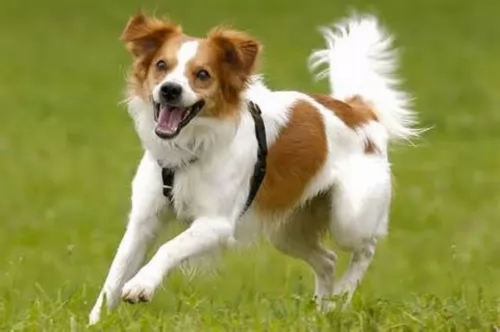 Many troops of World War 1 and World War II would have some or other mascot that they would keep close to them as a reminder of home. The mascot would also inspire them, giving them hope to endure.
Many troops of World War 1 and World War II would have some or other mascot that they would keep close to them as a reminder of home. The mascot would also inspire them, giving them hope to endure.
A Kromfohrlander dog, ‘Original Peter’ was one such mascot – a scruffy Terrier-type dog that army troops from the USA found in France.
This particular dog was accidentally mated with a Fox Terrier, with the breed essentially developing from the military dog from the 1940s. After 10 years of development, the Federation Cynologique Internationale accepted the breed in August, 1955.
It is still a rare breed, being found mainly in Germany.
 As a medium-sized, muscular dog which stands at roughly 45cm to 54cm in height and weighs 18 – 25kg, the German Spaniel is a sporty gun dog who has a long back in relation to his height.
As a medium-sized, muscular dog which stands at roughly 45cm to 54cm in height and weighs 18 – 25kg, the German Spaniel is a sporty gun dog who has a long back in relation to his height.
The ears are long and floppy with wavy or curly hair that will need to be attended to so as to avoid matting.
He has a long, wavy or curly weather-resistant coat, being short on the head but with feathering around the legs and stomach. Color of the coat includes brown, reddish brown and white. The white markings can be found on the chest of the dog, the legs, tails and muzzle. `
The German Spaniel loves to work and be busy and if he can be included in his human family’s activities, then so much the better. He is a social dog and gets on well with other dogs as well as children in the home. The German Spaniel is an intelligent dog and easily trained. In fact training and socialization are important for him, making him obedient and a pleasure to have around.
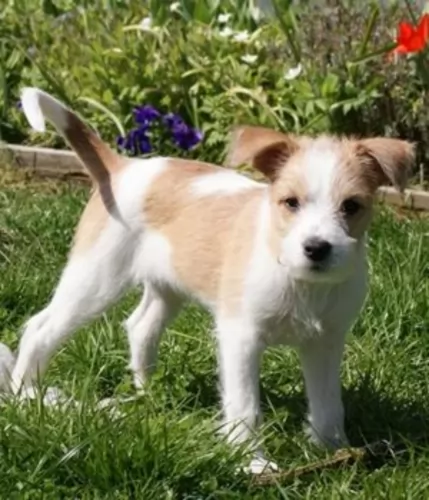 Fondly referred to as the Kromi or the Lander, the purebred Kromfohrlander, known as a companion dog, is medium sized.
Fondly referred to as the Kromi or the Lander, the purebred Kromfohrlander, known as a companion dog, is medium sized.
Both males and females stand at roughly 38 – 46cm in height and they weigh about 9 – 16kg.
They have two different coat types – the smooth haired one and the rough haired one, both coming with a soft undercoat. The dog is a moderate shedder. If you really want to be smart then the smooth coat is referred to as Glatthaar and the wire-haired Rauhaar. The color of the coat is white with brown, orange tan markings with the ears and part of the face mostly covered in the brown/tan markings.
The head of the dog is fairly round shaped and he has half-erect, half floppy ears. His legs are straight and firm and the medium length isn’t docked.
The Kromfohrlander is known for being a loving family pet that loves nothing more than staying within reach of one of his human family members. This closeness with his people means that he can adapt to life in the city or the countryside, so long as he is with his humans.
Wherever he lives though, because he is such an active dog he will require a good dose of mental- and physical stimulation. He is a docile dog, but not timid and not aggressive either, being friendly and amicable by nature. He makes a great playmate for children and is willing to get along with other pets in the home too.
 The German Spaniel makes a wonderful family pet. He is friendly and sociable, getting along well with just about all dogs and people. He loves his human family, wanting to be involved in all their activities.
The German Spaniel makes a wonderful family pet. He is friendly and sociable, getting along well with just about all dogs and people. He loves his human family, wanting to be involved in all their activities.
He is an active dog, used to hunting and being outdoors and he will therefore require a good deal of exercise from his owners, otherwise he becomes bored and frustrated and even destructive.
He is an adaptable dog, living in the city or the countryside, but wherever he is, exercise is important. Docile and non-aggressive, he has got all the characteristics that make him a splendid family pet.
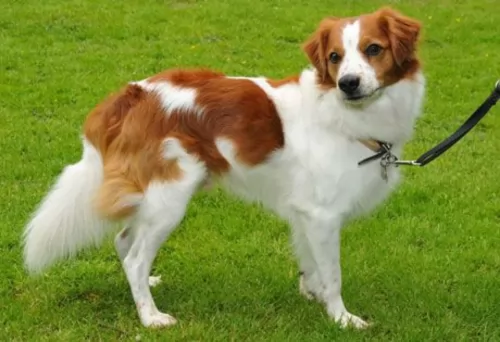 The Kromfohrländer is one of those dogs that has been bred specifically to be man’s best friend.
The Kromfohrländer is one of those dogs that has been bred specifically to be man’s best friend.
When you delve into his history you see that he has never had any particular role as a working- or hunting dog but that he has been bred to be a companion animal.
He can’t be left alone for too many hours as his very nature makes it that he longs to be around his human family constantly. He is therefore not a dependant dog, relying totally on his human family for his sense of well-being.
Low maintenance, easy-going, loving, devoted, lively and social, when you bring the medium-sized Kromfohrlander into your home, it won’t be long before he will have crept into your heart as well.
 Health problems are fairly unknown with the robust German Spaniel, and if well cared for, he can reach 12 to 15 years of age.
Health problems are fairly unknown with the robust German Spaniel, and if well cared for, he can reach 12 to 15 years of age.
There are always one or two hereditary health concerns, and the health issues that affect the breed the most are hip dysplasia, skin allergies and splayed feet.
The American Kennel Club tells us that this type of foot is flat, with spreading toes. It is a fault in your pet because it doesn’t support his weight well, causing health problems later on for your pet. This is why it is so important to have your pet’s nails clipped from time to time, because long nails can turn a good paw into a splayed one, actually injuring the tendons.
 Feisty, energetic, full of life, entertaining and comical, your Kromfohrlander is intelligent too and with good care, exercise and lots of love your dog will maintain all these good characteristics and reach anything from 12 to 16 years of age.
Feisty, energetic, full of life, entertaining and comical, your Kromfohrlander is intelligent too and with good care, exercise and lots of love your dog will maintain all these good characteristics and reach anything from 12 to 16 years of age.
However, there are some dog illnesses that could affect your dog such as hip dysplasia, ear- and eye infections such as lens luxation which can actually cause loss of vision, cancer, diabetes, epilepsy, bloat and others.
Dogs that are ignored in terms of getting enough exercise are prone to weight gain and this in itself can lead to joint disease and other illnesses.
 Shedding quite heavily and seasonally, the German Spaniel’s thick coat will require being brushed twice a week to keep it shiny and healthy. He loves the attention you give him at the same time.
Shedding quite heavily and seasonally, the German Spaniel’s thick coat will require being brushed twice a week to keep it shiny and healthy. He loves the attention you give him at the same time.
There are some German Spaniel owners who like to take their dogs in for professional grooming, requesting that the coat be cut short all round.
The long ears of your German Spaniel, especially if your pet spends a lot of time swimming, can be permanently damp, picking up dirt easily. Check inside the ears and make sure they are dry and clean to prevent ear infections.
Make sure to brush his teeth 2 or 3x a week as well because plaque build up leads to dental disease but it also negatively affects other body organs too, shortening your pet’s life.
Every dog, just like any human being, requires good nutrition, fresh water and warm, dry sleeping facilities to remain happy and to give him a good chance at longevity.
Apart from the very best commercially manufactured dog foods, ensure he occasionally gets some raw meat in as well as some cooked brown rice, vegetables and chicken. These can be added into his kibble.
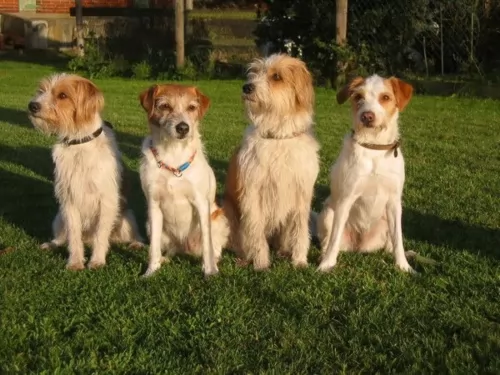 Your Kromfohrlander has two coat types - wirehaired or smooth. Don’t be overwhelmed by the brush and comb selections there are to keep his coat shiny ad healthy.
Your Kromfohrlander has two coat types - wirehaired or smooth. Don’t be overwhelmed by the brush and comb selections there are to keep his coat shiny ad healthy.
The idea is to simply choose a brush such as a bristle brush that can be used on all coat types. A brush like this will allow you to gently brush your pet’s coat to remove grass, dust and burrs and to make it a pleasant experience for your pet.
You want your Kromfohrlander to look forward to his brushing session. You can check him over for lumps, fleas and ticks at the same time.
Other grooming routines that your Kromfohrlander will need is nail clipping, checking inside and outside the ears for fleas and ticks as well as wax- and dirt build-up as well as teeth brushing. If teeth brushing for dogs is new to you there are pet groomers and even your vet who will offer this important service for you.